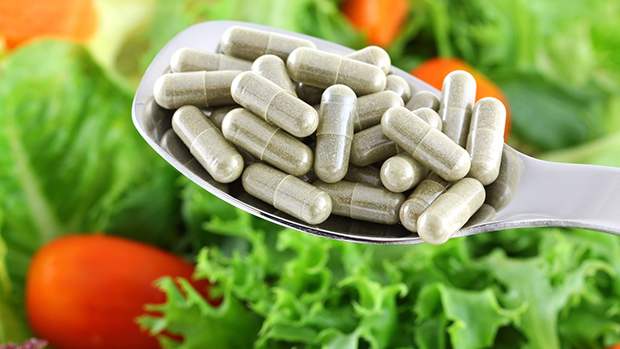Ask your doctor. Ask a dietician. Ask the FDA. They'll all tell you the same thing:
You probably don't need supplements. Just eat whole foods. They're way better. And supplements, well, they're kinda questionable anyway. I mean, did you hear about those wrestlers who died from taking the steroid creatine? Just drink your fat-free corn syrup and stop asking about supplements, okay? Run along now.
Well, with all due respect for my doctor (who spent a whole hour in med school learning about supplements 25 years ago) and my dietician (who's incongruously kinda chubby) and my government (who still advises an overweight population to eat lots of bread), we're not going to run along. We're going to ask questions.
And what better person to question than Dr. Lonnie Lowery, who's a legitimate nutritionist and a lifelong bodybuilder and an academic who's been involved in dietary supplement research since 1989.
A few days ago I called him up and asked a seemingly simple question: "Are whole foods always superior to supplements?"
Here's what he had to say.
Preface
"First let me state the obvious," Lowery says. "Whole foods should make up the majority of any long-term diet. Athletes need to learn about them and how to incorporate them into their lifestyle. We humans have evolved alongside unrefined plant and animal foods for over a hundred thousand years and our biochemistries are built to consume them.
"But terms like 'natural' have been abused to the point that the FDA has had to issue warnings about its over-interpretation. So, for the sake of argument, let's defend dietary supplements, in part because so few health authorities do so."
And thus we began.
Protein Shakes vs. Regular Meals
You may not believe this, but there are some crazy people out there doing protein-shake diets. No, for real. And while you'd expect the learned academics to scoff, Dr. Lowery says that times may be changing.
"I've seen three studies that support the idea that meal replacement shakes are effective for fat loss and may be better than traditional restrictive dieting," he notes. One idea is to kick off a healthy diet with a protein-shake diet, get rapid results, then transition into a healthy solid-food plan.
"Protein keeps your metabolism up and it helps spare muscle tissue," says Lowery. "The medical community has been using what are basically protein-shake diets in clinical settings for ages: the protein-sparing modified fast (PSMF). I think it's kinda strange that certain health care authorities try to demonize protein drinks and yet they use them themselves to treat the morbidly obese!"
Lowery also notes that a lot of the efficacy of protein shake diets has to do with dieter compliance, or the "behavioral ease" of these plans. Drink multiple protein shakes a day and you're less hungry than the typical dieter. Shakes are also portable, they taste good if you get the right brand, and there's much less room in the diet to screw up. (Your meals are convenient and ready to go, no calorie counting, label reading, or choices to make.)
Lowery also points out that protein shakes are often superior to whole foods when it comes to getting a caloric surplus. "That's what it takes to build muscle – a surplus of calories, around 2800 calories to synthesis a pound of muscle," says Lowery. "With shakes this is very easy because you add what you want to them. I've even made chocolate shakes with graham crackers!"
Studies often back up what we bodybuilder-types have known for years: drinking that surplus of calories is easier than chewing it. The problem with big solid-food meals is that after one or two of them, the mass-seeking lifter will often down-regulate (compensate) later in the day or the next day. He's full, plain and simple. Liquids on the other hand have much faster gastric emptying.
"The summary here is that protein shakes work for dieting phases or mass stages, and they often work better than solid foods because of compliance issues," says Lowery. "I'm not saying to consume liquid diets forever, but they can be used to kick-off a fat loss plan or add a calorie surplus to a weight-gain plan."
For the longer term bodybuilding plan, take the advice of Lowery's old mentor, Dr. Peter Lemon, who suggested that their research subjects should get no more than 50% of their calories from liquid supplements.
Bodybuilding Supplements Bad!
Old People Supplements Good!
Speaking of meal replacement shakes, ever notice that many healthcare professionals will poo-poo protein shakes then turn around and recommend drinks like Ensure or Carnation Instant Breakfast?
Ready-to-drink shakes like these promise "complete, balanced nutrition" and the Ensure website advises, "It's your health! Take charge of it!"
So let's check out their ingredient list, shall we? Prevalent ingredients include corn syrup, sugar, corn maltodextrin, and soy protein.
What the hell is going on here? Dr. Lowery elucidates:
"Historically, when doctors and hospitals have given their patients the usual 'clinical' supplement drinks, they've basically pumped sick people full of sugar and/or vegetable oil. Why? I've asked them. They said it's because it tastes good and most sick people under-eat anyway. My response was, 'So why don't we make good nutrition taste better?"
Vegetable oil (like safflower, palm and soybean) mixed with sugar, says Dr. Lowery, is one of the most fattening and pro-inflammatory concoctions you can consume. I bet these people would do better with a more refined product from the sports supplement industry, which is exactly what these same clinicians often demonize.
"They'd probably embrace sports nutrition drinks if you relabeled the bottle and didn't let on that it was a bodybuilding supplement," adds Lowery.
The Spoilage Issue
Protein foods spoil quickly but protein powders do not. Simply put, dry things don't develop bacteria the way moist things do (which, come to think of it, explains a lot about Pamela Anderson.)
"One of the best things to do with protein powder is put it into a shaker bottle dry with no water. Then, take it with you. Later you can fill it up at a water fountain or whatever," says Lowery.
Dr. Lowery works with a lot of collegiate athletes, most of whom skip meals. "It's horrendous," he says. "I always face the challenge of getting them to consume protein foods when they're running around all day. Protein foods spoil, unless you can get them to eat tuna out of a can between classes. So again, protein powders work well in this situation. Some will take their dry powders with them in bottles and use them when needed. Finally, they're not wasting all that effort in the gym by skipping meals!"
Unfortunately, Dr. L and NCAA programs in general can't directly dispense drinks that are greater than 30% protein by calorie content. You heard that right. Despite controversy, this rule remains. Sadly, it's a rule that could be removing an often-needed tool from the athletes' nutritional arsenals.
Dietary fat supplements can also beat out whole foods in the spoilage department. Long-chain, highly unsaturated fats like fish oils or flax also go rancid at room temperature. BUT, this won't happen quickly if they're in a capsule because oxygen can't get to the good stuff.
"Many people in the health industry seem to think that if you encapsulate a nutrient that it's 'bad.' But you haven't changed the nutrient just because you put it in a capsule," says Lowery.
Spoilage may not seem like a big issue, but at a time when most people are away from home, taking shorter lunch breaks, having longer commutes, and are generally busier than ever, having portable nutrition that won't go bad is crucial, especially if you're an on-the-go bodybuilder or athlete.
Nutrient Amounts: The Pill vs. The Fork
"You can get huge amounts of EPA/DHA into fish oil gelcaps, more than you're likely to ever get eating fish," says Lowery. "And even if you eat that much fish, remember that we live in a polluted world. Whether it's wild or farm-raised, fish often has heavy metal contamination or some kind of organic pesticide contamination. I'd much rather have a highly-concentrated, pure fish oil supplement that I trust."
Lowery notes that he has nothing against eating salmon, cod, and other fish, but a bodybuilder simply can't get enough of the good stuff from eating fish as he can from taking a fish oil supplement. And even if he could, there are those contamination issues to worry about with daily quantities that large.
"It's not just fish oil either," says Lowery, "but also things like CLA. You could easily consume a couple grams of CLA every day through supplements, but you'd have to consume gigantic, unrealistic amounts of milk, beef, and turkey to get that amount."
Creatine falls into the same category. It would take about ten pounds of uncooked steak to get the amount of creatine you'd need for loading. Clearly, creatine supplements are superior than whole food sources (and about ten cents a serving!).
Vitamin D? Same thing. You simply cannot drink enough D-fortified milk to get your blood levels up to healthy levels. Most of us must supplement. "This is especially true for those of us who live in an area of the country where the sun is simply not an option right now!" adds a pasty-white Lowery.
Now, if there are any doctors, dieticians, or government officials who'd like to tell us to drink 14 gallons of milk per day instead of taking a four-cent Vitamin D pill, we're ready to hear from you!
But Supplements are Refined ! And Refined is Always Bad, Right?
Not necessarily. For example, quality fish oil supplements are refined to remove all the bad stuff, like mercury. Supplemental milk proteins are refined to remove the lactose and other stuff we don't want while keeping the good stuff we do want.
"The term refined, as it applies to supplements, doesn't mean removing important aspects of it as it means when we talk about refined foods (e.g. adding copious amounts of sodium). The intent of refinement, in this case, is to make it better," says Lowery.
Still, Dr. Lowery often hears this criticism made against food supplements. "The only time this might make sense is if they were talking about an incomplete protein or amino acid supplement, but no savvy protein consumer would live off of an incomplete protein source or amino acid pills alone."
"Don't get me wrong," Lowery adds, "Some protein supplements are full of crap. For example, I've seen ads saying a protein powder contains '10,000 milligrams of peptide-armed amino acids!' But that's just 10 grams of protein. It's a cup of milk! You don't measure protein in milligrams!"
And protein bars? Don't even get him started. "Athletes have got to be aware that the 25 grams of protein on the label could be largely bogus. Some companies add biologically useless proteins like collagen and gelatin to bump-up their numbers. Please, people, dig deeper. Read the ingredients list on your protein bar and be sure it doesn't have these incomplete, unhelpful proteins high in the list!" advises Lowery.
In summary, legitimate refined supplements? No problem. They're refining out the stuff in there we don't want. Refined carb foods? Not so good. In that case, food manufacturers are refining out stuff we do want, like fiber.
So, pass the refined protein powder and fish oils, please.
Nutrient and Drug Timing
Supplements can have another advantage over whole foods: precise timing. Where foods may slowly deliver the goods you want, supplements can deliver them exactly when you want and in the precise amount you want.
Let's take one of Lowery's favorites here: caffeine. If you want a quick hit of exactly 200mg of caffeine, you can pop a caffeine tablet. Drinking coffee is fine, but "iffy." You can't really chug it, it doesn't hit you as quickly, and the exact caffeine content can vary. Plus, barring iced coffee, when it's 99 degrees in the summer, a cup of coffee before squat day may not sound too appealing.
"People tend to drink coffee like they smoke. It's drawn out and sipped throughout the day," Lowery says. "I'm not sure doses of caffeine that low and spread apart are really doing very much. They certainly don't do anything for performance purposes. To enhance performance you need a larger hit, all at one time. Most research suggests six mg per kilo of body weight (probably less to enhance fat loss). And remember, caffeine is not the exact same thing as coffee."
Although he loves his java, Lowery concludes by saying that he believes it's healthier and more effective to dose caffeine as a supplement rather than drink cup after cup of coffee all day long. In other words, use your chosen substance or nutrient tactically.
Fiber Without Carbs
What's the first thing you notice when you go on a strict low-carb diet? Oh, you notice that you'd sell your soul for a Dorito? Um, okay.
What's the second thing you notice? Yeah, it's sometimes tough to drop carbs and get adequate fiber. Again, this is where supplements shine.
"The are plenty of foods where you can get plenty of fiber while keeping the carbs low. Think of fibrous broccoli and cauliflower," says Lowery. "I'd rather see people going the whole food route, if they can comply with it. Vegetables certainly beat fiber supplements. But let's face it, some people just really don't like vegetables or have the time or desire to prepare them."
So again we're back to compliance. Yes, it's possible to get adequate fiber on a reduced-carb diet, but is it easily doable for the dieter who works in an office all day or attends classes? In those cases, slamming down a fiber supplement or adding it to something you're already drinking is probably more realistic than steaming a pound of broccoli at your office desk during coffee break.
And remember, there are some low-carb diets that don't allow vegetables initially, so in those cases, fiber supplements can come in very handy.
So, whole foods are better when it comes to getting fiber. You just can't beat getting all those cancer-fighting phytochemicals you'll get along with your fiber. But fiber supplements are fast and convenient as part of the picture if you're having compliance issues.
Phytochemicals: Whole Foods Win
So, at this point, we've been pointing out overlooked benefits regarding oft-maligned dietary supplements. But there are instances where nature simply has too much time and experience on us, and whole foods flat out win.
"Fruits and vegetables have healthful phytochemicals that operate metabolically in unknown combinations," says Dr. Lowery. "Supplements don't always work the way whole foods work in that regard."
Here's an example: There's a famous study about beta-carotene and smokers. Basically, it was found that smokers who ate a lot of beta-carotene-rich fruits and vegetables didn't get lung cancer as quickly.
So the smart folks in lab coats did a clinical trial where they fed smokers only supplemental beta-carotene. To the researcher's dismay, the rates of lung cancer increased in those who only took the supplemental form of beta-carotene.
"That became a classic example of why we should often just trust Mother Nature and the whole food approach," says Lowery.
Supps vs. Foods: The Conclusion
Despite the dire warnings against pills and powders by your doctor or run-of-the-mill dietitians, supps can do things that whole foods just can't.
Prime examples include creatine, fish oils, CLA, Vitamin D, and things like resveratrol which you simply can't get enough of from whole foods to have a medicinal or physique-enhancing impact. Even protein powders are now seen by the scientific community as having strategic advantages over whole foods.
Compliance plays a big role here too. So while there's lots of advantages to eating tons of organic green vegetables and exotic berries a day, in reality you're probably going to be more compliant just taking your Superfood. It just saves time and money.
But when taken in context, Mother Nature is a wise, wise broad, and she knows more than we do about the magical marriage of phytochemicals and human physiology. So is Dr. Lowery saying to replace your whole foods with supplements? Not at all. But he is saying that sometimes supplements have clear advantages over whole foods.
The science and research community are catching on, too. That means lagging health practitioners, and even the guvment will catch on in, oh, about 15 to 20 years. Until then, eat your whole foods and take your pills and powders.






